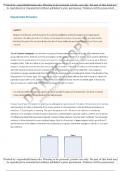Chromatography tlc lab - Study guides, Class notes & Summaries
Looking for the best study guides, study notes and summaries about Chromatography tlc lab? On this page you'll find 33 study documents about Chromatography tlc lab.
All 33 results
Sort by
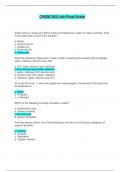
-
CHEM 343 Lab Final Exam | Questions with Verified Answers
- Exam (elaborations) • 16 pages • 2024
-
- $17.99
- + learn more
CHEM 343 Lab Final Exam | Questions with Verified Answers Acetic acid is a weak acid. When acetic acid dissolves in water to make a solution, what is the major form of acid in the solution? a. Water b. Hydronium ion c. Acetate ion d. Hydroxide ion e. Acetic acid Rank the following compounds in order of their increasing pKa (lowest pKa to highest): water, methane, benzoic acid, HCl a. HCl, water, benzoic acid, methane b. HCl, benzoic acid, water, methane c. water, methane, HCl, benzoic acid d....
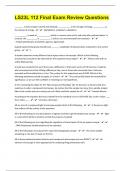
-
LS23L 112 Final Exam Review Questions Correctly Answered|2024
- Exam (elaborations) • 9 pages • 2024
-
- $8.49
- + learn more
________ is how energy is stored and released; ___________ is the storage of energy, ___________is the release of energy. - ️️Metabolism, anabolism, catabolism. ___________ is made of ___________, which is a neuron toxin and is safe only after polymerization. In contrast, the _________ in __________ is safe to use and extracted from seaweed. - ️️Polyacrylamide gel, acrylamide, agarose, agarose gel. A good experimental group should have _______ variable(s) introduced when compared to th...
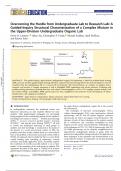
-
Overcoming the Hurdle from Undergraduate Lab to Research Lab: A Guided-Inquiry Structural Characterization of a Complex Mixture in the Upper-Division Undergraduate Organic Lab
- Exam (elaborations) • 4 pages • 2024
-
- $7.99
- + learn more
Overcoming the Hurdle from Undergraduate Lab to Research Lab: A Guided-Inquiry Structural Characterization of a Complex Mixture in the Upper-Division Undergraduate Organic Lab Devin R. Latimer,* Athar Ata, Christopher P. Forfar, Mustafa Kadhim, April McElrea, and Ramon Sales Department of Chemistry, University of Winnipeg, 515 Portage Avenue, Winnipeg, Manitoba R3B 2E9, Canada *S Supporting Information ABSTRACT: This guided-inquiry, upper-division undergraduate organic lab experiment, a h...
TLC LAB PROCEDURE/Thin-Layer Chromatography Lab Report 2023
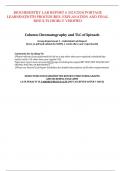
-
BIOCHEMISTRY LAB REPORT 6 2023/2024| PORTAGE LEARNING|WITH PROCEDURES, EXPLANATION AND FINAL RESULTS.HIGHLY VERIFIED Column Chromatography and TLC of Spinach Group Experiment 3 – Individual Lab Report (Save as pdf and submit by NOON, 1 week after your e
- Exam (elaborations) • 5 pages • 2024
- Available in package deal
-
- $11.49
- + learn more
BIOCHEMISTRY LAB REPORT 6 2023/2024| PORTAGE LEARNING|WITH PROCEDURES, EXPLANATION AND FINAL RESULTS.HIGHLY VERIFIED Column Chromatography and TLC of Spinach Group Experiment 3 – Individual Lab Report (Save as pdf and submit by NOON, 1 week after your experiment)
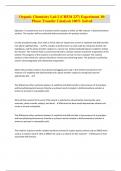
-
Organic Chemistry Lab I (CHEM 237) Experiment 10: Phase Transfer Catalysis 100% Solved
- Exam (elaborations) • 2 pages • 2024
- Available in package deal
-
- $7.99
- + learn more
Organic Chemistry Lab I (CHEM 237) Experiment 10: Phase Transfer Catalysis 100% Solved Objective: To examine the use of a phase transfer catalyst to effect an SN2 reaction in dichloromethane solution. The reaction will be conducted without extraction for product isolation. List the procedural steps, from start to finish, that are required to convert 2-naphthol and allyl bromide into allyl 2-naphthyl ether. - The reaction is performed on a small scale by mixing the alcohol, the haloalkane, ...
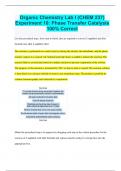
-
Organic Chemistry Lab I (CHEM 237) Experiment 10: Phase Transfer Catalysis 100% Correct
- Exam (elaborations) • 5 pages • 2023
- Available in package deal
-
- $8.99
- + learn more
Organic Chemistry Lab I (CHEM 237) Experiment 10: Phase Transfer Catalysis 100% Correct List the procedural steps, from start to finish, that are required to convert 2-naphthol and allyl bromide into allyl 2-naphthyl ether. The reaction is performed on a small scale by mixing the alcohol, the haloalkane, and the phase transfer catalyst in a conical vial. Sodium hydoxide (base) is added to initiate the reaction. The reaction flask is covered and stirred to conduct reaction to prevent evaporation...
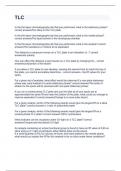
-
TLC exams and the correct answers 2034
- Exam (elaborations) • 2 pages • 2024
- Available in package deal
-
- $10.89
- + learn more
In the thin-layer chromatography lab that you performed, what is the stationary phase? correct answersThe silica on the TLC plate In the thin-layer chromatography lab that you performed, what is the mobile phase? correct answersThe liquid solvent in the developing chamber In the thin-layer chromatography lab that you performed, what is the analyte? correct answersThe substance or mixture to be separated The distance a compound moves on a TLC plate is an indication of...? correct answers...
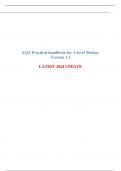
-
AQA Practical handbook for A-level Biology Version 1.3 LATEST 2024 UPDATE
- Exam (elaborations) • 162 pages • 2024
-
- $17.48
- + learn more
Contents Section Page A Introduction 4 Information about practical work for teachers B Practical work in reformed A-level Biology, Chemistry and Physics 7 C Practical skills assessment in question papers 12 D Guidelines for supporting students in practical work 18 E Use of lab books 20 F Cross-board statement on CPAC 22 G Evidence for the endorsement 31 H Questions from teachers following the first year of the practical endorsement 33 I Cross-board apparatus and techniques and AQ...
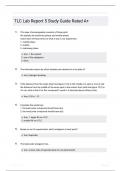
-
TLC Lab Report 5 Study Guide Rated A
- Exam (elaborations) • 3 pages • 2024
-
- $12.49
- + learn more
TLC Lab Report 5 Study Guide Rated A+ Thin Layer Chromatography consists of three parts: The analyte, the stationary phase, and mobile phase. Match each of these terms to what it was in our experiment. 1. Mobile Phase 2. Analyte 3. Stationary Phase The dominate reason by which analytes are retained on a TLC plate is? If the distance from the origin (start line Figure 10.2) to the middle of a spot is 4.8 cm and the distance from the middle of the same spot to the solvent front (end line F...

Do you wonder why so many students wear nice clothes, have money to spare and enjoy tons of free time? Well, they sell on Stuvia! Imagine your study notes being downloaded a dozen times for $15 each. Every. Single. Day. Discover all about earning on Stuvia

